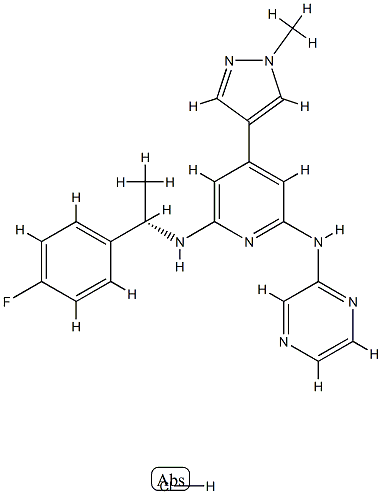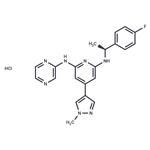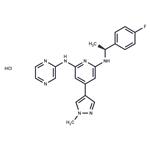Ilginatinib hydrochloride (NS-018 hydrochloride) is a highly active and orally bioavailable JAK2 inhibitor, with an IC50 of 0.72 nM, 46-, 54-, and 31-fold selectivity for JAK2 over JAK1 (IC50, 33 nM), JAK3 (IC50, 39 nM), and Tyk2 (IC50, 22 nM).
Ilginatinib (NS-018) is a highly active JAK2 inhibitor, with an IC50 of 0.72 nM, 46-, 54-, and 31-fold selectivity for JAK2 over JAK1 (IC50, 33 nM), JAK3 (IC50, 39 nM), and Tyk2 (IC50, 22 nM). Ilginatinib (NS-018) also inhibits Src-family kinases, especially SRC and FYN, and weakly inhibits ABL and FLT3 with 45- and 90-fold selectivity for JAK2, respectively. Ilginatinib (NS-018) shows potent inhibitory activity against cell lines JAK2V617F or MPLW515L mutations or the TEL-JAK2 fusion gene (expressing a constitutively activated JAK2) with IC50 of 11-120 nM, but has only minimal cytotoxicity against most other hematopoietic cell lines that have no constitutively activated JAK2[1]. Ilginatinib (NS-018) (0.5 μM) preferentially suppresses colony-forming unitgranulocyte/macrophage (CFU-GM) formation from myelodysplastic syndrome (MDS)-derived bone marrow mononuclear cells (BMMNCs). NS-018 (1 μM) suppresses the phosphorylation of STAT3 (the downstream kinase of JAK2) in CFU-GM-forming cells from MDS patients[2].
Ilginatinib (NS-018) (12.5, 25, 50, 100 mg/kg, p.o.) potently prolongs the survival of mice and reduces splenomegaly in a mouse Ba/F3-JAK2V617F disease model. Ilginatinib (NS-018) (25, 50 mg/kg, p.o.) significantly reduces leukocytosis, hepatosplenomegaly and extramedullary hematopoiesis, improves nutritional status, and prolongs survival in JAK2V617F transgenic mice[1].


